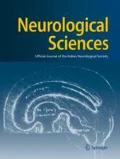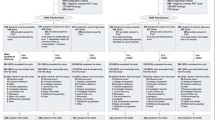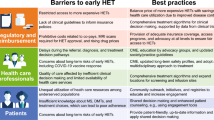Abstract
Background
A significant proportion of patients with multiple sclerosis (MS) show cognitive impairment.
Objective
To evaluate the effect of 2-year treatment with oral dimethyl fumarate (DMF) on cognition in relapsing remitting MS (RRMS).
Methods
In this prospective single-arm study RRMS patients treated with DMF underwent a wide battery of tests, including an extensive neuropsychological evaluation, clinical and patient-reported outcomes (PROs) and quality of life (QoL). Primary endpoints were the proportion of patients with cognitive impairment at baseline and of patients with cognitive worsening over 2 years.
Results
Overall, 217 patients (74.2% females, mean age 37.3 years) receiving DMF were recruited, and 156 (67.2%) completed the study. Of the 49 patients with cognitive impairment at baseline, 34 had 2-year data: 15 (44.1%) patients worsened and 19 (55.9%) did not. The cognitive impairment index improved in one third of patients at 2 years. Less than 20% of patients had relapses at 2 years (annualized relapse rate: 0.190). Few patients had disability progression. PROs (fatigue, depression, impairment in work/social activities), QoL, and most of neuropsychological tests significantly improved vs. baseline.
Conclusion
The 2-year treatment with DMF was associated with slowing of cognitive impairment and with significant improvements in QoL and psychosocial function.


Similar content being viewed by others
References
Amato MP, Portaccio E, Goretti B, Zipoli V, Hakiki B, Giannini M, Pastò L, Razzolini L (2010) Cognitive impairment in early stages of multiple sclerosis. Neurol Sci 31(Suppl 2):S211–S214
Bobholz JA, Rao SM (2003) Cognitive dysfunction in multiple sclerosis: a review of recent developments. Curr Opin Neurol 16(3):283–288
Amato MP, Portaccio E, Goretti B, Zipoli V, Iudice A, Della Pina D, Malentacchi G, Sabatini S, Annunziata P, Falcini M, Mazzoni M, Mortilla M, Fonda C, De Stefano N, TuSCIMS Study Group (2010) Relevance of cognitive deterioration in early relapsing-remitting MS: a 3-year follow-up study. Mult Scler 16(12):1474–1482
Rogers JM, Panegyres PK (2007) Cognitive impairment in multiple sclerosis: evidence-based analysis and recommendations. J Clin Neurosci 14(10):919–927
Achiron A, Barak Y (2003) Cognitive impairment in probable multiple sclerosis. J Neurol Neurosurg Psychiatry 74(4):443–446
Deloire MS, Salort E, Bonnet M, Arimone Y, Boudineau M, Amieva H, Barroso B, Ouallet JC, Pachai C, Galliaud E, Petry KG, Dousset V, Fabrigoule C, Brochet B (2005) Cognitive impairment as marker of diffuse brain abnormalities in early relapsing remitting multiple sclerosis. J Neurol Neurosurg Psychiatry 76(4):519–526
Feuillet LF, Reuter F, Audoin B, Malikova I, Barrau K, Cherif AA, Pelletier J (2007) Early cognitive impairment in patients with clinically isolated syndrome suggestive of multiple sclerosis. Mult Scler 13(1):124–127
Glanz BI, Holland CM, Gauthier SA, Amunwa EL, Liptak Z, Houtchens MK, Sperling RA, Khoury SJ, Guttmann CR, Weiner HL (2007) Cognitive dysfunction in patients with clinically isolated syndromes or newly diagnosed multiple sclerosis. Mult Scler 13(8):1004–1010
Potagas CE, Giogkaraki E, Koutsis G, Mandellos D, Tsirempolou E, Sfagos C, Vassilopoulos D (2008) Cognitive impairment in different MS subtypes and clinically isolated syndromes. J Neurol Sci 267(1–2):100–106
Zipoli V, Goretti B, Hakiki B, Siracusa G, Sorbi S, Portaccio E, Amato MP (2010) Cognitive impairment predicts conversion to multiple sclerosis in clinically isolated syndromes. Mult Scler 16(1):62–67
Gold R, Kappos L, Arnold DL, Bar-Or A, Giovannoni G, Selmaj K, Tornatore C, Sweetser MT, Yang M, Sheikh SI, Dawson KT, DEFINE Study Investigators (2012) Placebo-controlled phase 3 study of oral BG-12 for relapsing multiple sclerosis. N Engl J Med 367(12):1098–1107
Fox RJ, Miller DH, Phillips JT, Hutchinson M, Havrdova E, Kita M, Yang M, Raghupathi K, Novas M, Sweetser MT, Viglietta V, Dawson KT, CONFIRM Study Investigators (2012) Placebo-controlled phase 3 study of oral BG-12 or glatiramer in multiple sclerosis. N Engl J Med 367(12):1087–1097
Giovannoni G, Gold R, Kappos L, Arnold DL, Bar-Or A, Marantz JL, Yang M, Lee A (2016) Delayed-release dimethyl fumarate and disability assessed by the multiple sclerosis functional composite: integrated analysis of DEFINE and CONFIRM. Mult Scler J Exp Transl Clin 2:2055217316634111
Kita M, Fox RJ, Gold R, Giovannoni G, Phillips JT, Sarda SP, Kong J, Viglietta V, Sheikh SI, Okwuokenye M, Kappos L (2014) Effects of delayed-release dimethyl fumarate (DMF) on health-related quality of life in patients with relapsing-remitting multiple sclerosis: an integrated analysis of the phase 3 DEFINE and CONFIRM studies. Clin Ther 36(12):1958–1971
Polman CH, Reingold SC, Edan G, Filippi M, Hartung HP, Kappos L, Lublin FD, Metz LM, McFarland HF, O'Connor PW, Sandberg-Wollheim M, Thompson AJ, Weinshenker BG, Wolinsky JS (2005) Diagnostic criteria for multiple sclerosis: 2005 revisions to the “McDonald Criteria”. Ann Neurol 58(6):840–846
Rao SM (1990) A manual for the brief repeatable battery of neuropsychological tests in multiple sclerosis. National Multiple Sclerosis Society, New York
Stroop J (1935) Studies of interference in serial verbal reactions. J Exp Psychol 18:643–662
Amato MP, Portaccio E, Goretti B, Zipoli V, Ricchiuti L, De Caro MF, Patti F, Vecchio R, Sorbi S, Trojano M (2006) The Rao’s Brief Repeatable Battery and Stroop Test: normative values with age, education and gender corrections in an Italian population. Mult Scler 12(6):787–793
Goretti B, Niccolai C, Hakiki B, Sturchio A, Falautano M, Minacapelli E, Martinelli V, Incerti C, Nocentini U, Murgia M, Fenu G, Cocco E, Marrosu MG, Garofalo E, Ambra FI, Maddestra M, Consalvo M, Viterbo RG, Trojano M, Losignore NA, Zimatore GB, Pietrolongo E, Lugaresi A, Langdon D, Portaccio E, Amato MP (2014) The brief international cognitive assessment for multiple sclerosis (BICAMS): normative values with gender, age and education corrections in the Italian population. BMC Neurol 14:171
Kurtzke JF (1983) Rating neurologic impairment in multiple sclerosis: an expanded disability status scale (EDSS). Neurology 33:1444–1452
Montgomery SA, Asberg M (1979) A new depression scale designed to be sensitive to change. Br J Psychiatry 134:382–389
Fisk JD, Pontefract A, Ritvo PG, Archibald CJ, Murray TJ (1994) The impact of fatigue on patients with multiple sclerosis. Can J Neurol Sci 21(1):9–14
Euro-Qol Group (1990) EuroQol-a new facility for the measurement of health-related quality of life. The EuroQol group. Health Policy 16(3):199–208
Mellerup E, Fog T, Raun N, Colville P, De Rham B, Hannah B, Kurtzke JF (1981) The socio-economic scale. Acta Neurol Scand 64(suppl 87):130–138
Jongen PJ, Ter Horst AT, Brands AM (2012) Cognitive impairment in multiple sclerosis. Minerva Med 103(2):73–96
Huijbregts SC, Kalkers NF, de Sonneville LM, de Groot V, Polman CH (2006) Cognitive impairment and decline in different MS subtypes. J Neurol Sci 245(1–2):187–194
Khurana V, Sharma H, Afroz N, Calan A, Medin J (2017) Patient-reported outcomes in multiple sclerosis: a systematic comparison of available measures. Eur J Neurol 24(9):1099–1107
Derfuss T, Ontaneda D, Nicholas J, Meng X, Hawker K (2016) Relapse rates in patients with multiple sclerosis treated with fingolimod: subgroup analyses of pooled data from three phase 3 trials. Mult Scler Rel Disorders 8:124–130
Achiron A, Polliack M, Rao SM, Barak Y, Lavie M, Appelboim N, Harel Y (2005) Cognitive patterns and progression in multiple sclerosis: construction and validation of percentile curves. J Neurol Neurosurg Psychiatry 76:744–749
Acknowledgments
This study was sponsored by Biogen Italia S.R.L. (Milan, Italy). Writing and editorial support for the preparation of this manuscript was provided by Luca Cantini, M.D., professional medical writer from IQVIA.
Funding
Funding was provided by Biogen.
Author information
Authors and Affiliations
Corresponding author
Ethics declarations
Conflict of interest
VZ: employee of Biogen;
PT and BG: speaker honoraria from Biogen and Teva;
VBM: funding for travel and speaker honoraria and research support from Bayer Schering, Biogen, Merck Serono, and Sanofi-Genzyme;
PG: served on scientific advisory boards of Almirall, Bayer Schering, Biogen Italy, Merck Serono, Novartis, Roche, Sanofi-Aventis, and Teva; received travel funding and/or speaker honoraria from Biogen Italy, Merck Serono, Novartis, Roche, Sanofi-Aventis, and Teva;
MZ: honoraria for consultancy, lecturing, or participation in advisory boards and financial support for attending scientific meetings from Almirall, Biogen, Genzyme, Merck Serono, Novartis, and Teva;
MO, EC, and CP: scientific advisory boards for Actelion, Biogen, Genzyme, Merck Serono, Novartis, Roche, Sanofi, and Teva; consulting and/or speaking fees, research support, and travel grants from Allergan, Almirall, Biogen, Genzyme, Merck Serono, Novartis, Roche, Sanofi, and Teva;
MT: served on scientific advisory boards for Biogen, Genzyme, Novartis, and Roche; has received speaker honoraria from Almirall, Bayer Schering, Biogen, Genzyme, Merck Serono, Novartis, Sanofi-Aventis, and Teva; and has received research grants for her institution from Biogen, Merck Serono, and Novartis;
MPA: research grants and speaker honoraria from and member of advisory boards for Biogen, Bayer, Merck, Novartis, Roche, Sanofi-Genzyme, and Teva.
Ethical approval
All procedures performed in studies involving human participants were in accordance with the ethical standards of the reference institutional research committee of each participating site and with the 1964 Helsinki declaration and its later amendments or comparable ethical standards.
Informed consent
Informed consent was signed by all participants prior to any study-related procedure was started. The study protocol was approved by the reference Ethic Committee of each study site.
Additional information
Publisher’s note
Springer Nature remains neutral with regard to jurisdictional claims in published maps and institutional affiliations.
Electronic supplementary material
ESM 1
(DOCX 28 kb)
Rights and permissions
About this article
Cite this article
Amato, M.P., Goretti, B., Brescia Morra, V. et al. Effects of 2-year treatment with dimethyl fumarate on cognition and functional impairment in patients with relapsing remitting multiple sclerosis. Neurol Sci 41, 3185–3193 (2020). https://doi.org/10.1007/s10072-020-04320-w
Received:
Accepted:
Published:
Issue Date:
DOI: https://doi.org/10.1007/s10072-020-04320-w




